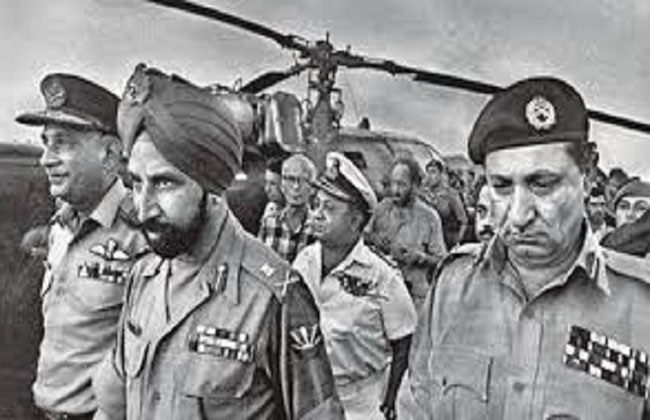
“The Moving Finger writes; and having writ,
Moves on: nor all your Piety nor Wit
Shall lure it back to cancel half a line
Nor all your Tears wash out a Word of it”
(Rubaiyat, Omar Khayyam)
Chairman of the Pakistan People’s Party (PPP), Zulfikar Ali Bhutto, made a startling announcement on landing in Karachi, a day after the launch of Operation Searchlight in Dacca [spell: Dhaka].
PPP had secured 81 out of 138 seats in the National Assembly in the election held in December 1970. All but one in the two provinces of Punjab and Sindh. The one was won in N.W.F.P. (renamed: Khyber Pakhtunkhwa). Not a single seat from Baluchistan or erstwhile East Pakistan [now Bangladesh].
However, Bhutto was never shy in presenting himself as the sole representative of erstwhile West Pakistan. The President and his Junta were happy in according him such recognition.
[Military dictator General] Yahya [Khan] had left Dacca clandestinely on the afternoon of March 25, 1971, with instructions to commence the operation when his PIA Boeing had entered West Pakistan airspace.
[Pakistan People’s Party (PPP) supremo Zulifqar Ali] Bhutto was at Hotel Dacca Intercontinental, a walking distance from the President House in Dacca, and not very far from Dacca University Campus where a prolonged battle in Dacca took place in the early hours of March 26, 1971.
Bhutto could and must have heard and seen quite a bit of the army’s movement and the exchange of fire. He had landed in Dacca a few days earlier on March 21, at the request of Yahya.
Ostensibly Yahya had foreseen that an agreement with Awami League was possible and it would be prudent to have the leader of the second-largest party in the National Assembly standing by, for sharing the conclusion.
It appears that the President and the C.M.L.A.’s [Chief Martial Law Administrator’s] attention was only on the three ‘states’ of the Federation of Pakistan. He paid little attention to the elected members of the National Assembly from N.W.F.P. and Baluchistan.
In ignoring the two constituent states of the federation Yahya had discarded his own Legal Frame Work Order, which had dissolved the One-Unit (creating four provinces in erstwhile West Pakistan) and established the rule of one man one vote, which had favoured the majority population of erstwhile East Pakistan.
At this point, he was also guilty according to Bhutto, the sole representation of the four provinces of Pakistan, two of them which he did not represent.
With the standoff in the President’s House that Bhutto had witnessed and the fact that Yahya did not share his plans of unleashing ‘Operation Searchlight’ with him before his departure, it was quite irresponsible for him to announce: “Thanks to Almighty God, Pakistan has at last been saved.” immediately on setting foot in Karachi.
It was a senseless statement coming from apparently the most intelligent man in South Asia! (That was exactly how he rated himself as mentioned by his later biographers). It came at a time when every sane person including the US Consul General in Dacca, the supporters of Awami League, and the gullible supporters of Pakistan, knew quite well that it was Jinnah’s Pakistan that was burning on the streets of Dacca and its suburbs. Sadly, this scribe, a nationalist Pakistani, was among the witness on the ground, watching tracer bullets, and broad walls of fire across the horizon of Dacca city.
This scribe can still recall the rattling of machine gun fire, when Radio Pakistan Dacca commenced its morning broadcast late in the mid-morning of March 26, declaring that The Pakistan army was fully in control all over East Pakistan and further imploring the citizens to deposit their licensed arms at the nearest police station. No functional Police Station existed, at the moment, in the length and breadth of the 55 thousand square miles of the Ganges Delta, which was known as East Pakistan a day earlier.
It is worth listening to the short interview, Bhutto gave in London on December 19, 1971, on his way back to Pakistan. His sole stress in answering the questions was the transfer of power. No remorse for the bloodshed, military defeat, and humiliating public surrender of the Pakistan Eastern Command.
Sharjeel Javaid, who was born in Dhaka and studied at Shaheen School and Notre Dame College before repatriating with his parents to Pakistan, is an independent writer and researcher based in Karachi, Pakistan


